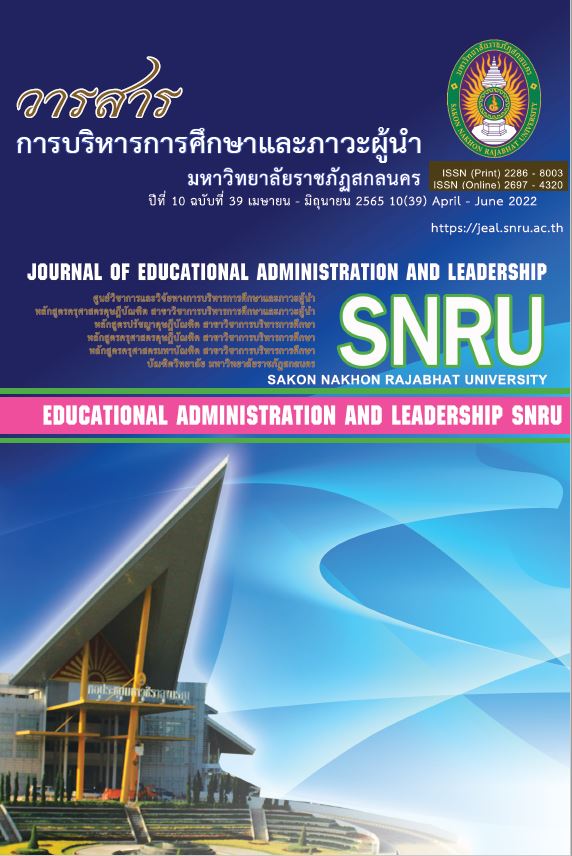

ปัจจัยที่ส่งผลต่อความสำเร็จในการนำหลักสูตรการป้องกันการทุจริตไปใช้ของ โรงเรียนสุจริตต้นแบบ สังกัดสำนักงานคณะกรรมการการศึกษาขั้นพื้นฐาน
Factors Affecting the Success of Implementing the Anti-Corruption Curriculum Of Upright School: The Office of The Basic
ผู้แต่ง
กิตติคุณกฤดากร สุขปัญญา, ผัสพรรณ ถนอมพงษ์ชาติ, ปัญญา อัครพุทธพงศ์
Author
Kittikhunkitsadakorn Sukpanya, Phasphan Thanompongchart, Panya Akkaraputtapong
บทคัดย่อ
การวิจัยนี้มีวัตถุประสงค์เพื่อวิเคราะห์ปัจจัยที่ส่งผลต่อความสำเร็จในการนำหลักสูตรการป้องกันการทุจริตไปใช้ของโรงเรียนสุจริตต้นแบบ สังกัดสำนักงานคณะกรรมการการศึกษาขั้นพื้นฐาน ประชากร ได้แก่ โรงเรียนสุจริตต้นแบบ สังกัดสำนักงานคณะกรรมการการศึกษาขั้นพื้นฐาน จำนวน 225 โรงเรียน ผู้ให้ข้อมูลประกอบด้วย ผู้อำนวยการโรงเรียน รองผู้อำนวยการ ฝ่ายวิชาการ และครูผู้สอนหลักสูตรการป้องกันการทุจริต โรงเรียนละ 3 คน รวมจำนวน 675 คน เครื่องมือ คือ แบบสอบถาม มีลักษณะเป็นมาตรประมาณค่า 5 ระดับ ค่าความสอดคล้องของแบบสอบถามทั้งฉบับอยู่ที่ 0.98 สถิติที่ใช้ในการวิเคราะห์ข้อมูลได้แก่ การหาค่าเฉลี่ย ร้อยละ ส่วนเบี่ยงเบนมาตรฐาน และการวิเคราะห์ถดถอยพหุคูณ
ผลการวิจัย พบว่า
1. ระดับการปฏิบัติงานเกี่ยวกับปัจจัยที่จะส่งผลต่อความสำเร็จในการนำหลักสูตร การป้องกันการทุจริตไปใช้ในภาพรวมอยู่ในระดับมากที่สุด (= 4.29) เมื่อพิจารณาปัจจัยเป็นรายด้านพบว่า ปัจจัยด้านการบริหารหลักสูตรมีค่าเฉลี่ยสูงสุด รองลงมาคือปัจจัยด้านการจัดการเรียนการสอน และปัจจัยด้านการสนับสนุนและส่งเสริมการใช้หลักสูตร สำหรับปัจจัยด้านการบริหารหลักสูตร พบว่า คุณธรรมจริยธรรมของผู้บริหาร มีค่าเฉลี่ยสูงที่สุด รองลงมา คือ การจัดตารางสอน และการจัดครูเข้าสอน ปัจจัยด้านการจัดการเรียนการสอน พบว่า การจัดกิจกรรมเสริมหลักสูตรด้านคุณธรรมจริยธรรมมีค่าเฉลี่ยสูงที่สุด รองลงมา คือ การศึกษาและวิเคราะห์หลักสูตร และการจัดทำแผนการจัดการเรียนรู้ ปัจจัยด้านการสนับสนุนและส่งเสริมการใช้หลักสูตร พบว่า การจัดบรรยากาศในโรงเรียนมีค่าเฉลี่ยมากที่สุด รองลงมา คือ การนิเทศติดตาม และการมีส่วนร่วมของผู้ปกครองและชุมชน
2. ระดับความสำเร็จในการนำหลักสูตรการป้องกันการทุจริตไปใช้ในภาพรวมอยู่ในระดับมากที่สุด (= 4.26) เมื่อพิจารณาเป็นรายด้านพบว่า ด้านผลสัมฤทธิ์ของผู้เรียนตามหลักสูตรมีค่าเฉลี่ยสูงสุด รองลงมา คือ คุณลักษณะที่พึงประสงค์ ในด้านผลสัมฤทธิ์ของผู้เรียนตามหลักสูตร พบว่า ด้านความรู้ความเข้าใจมีค่าเฉลี่ยมากที่สุด รองลงมาคือ ด้านการปฏิบัติตน ในด้านคุณลักษณะที่พึงประสงค์ พบว่า ตระหนักและเห็นความสำคัญของการต่อต้านและป้องกันการทุจริตมีค่าเฉลี่ยมากที่สุด รองลงมา คือ ปฏิบัติตนตามหน้าที่พลเมืองและมีความรับผิดชอบต่อสังคมและปฏิบัติตนเป็นผู้ที่ STRONG / จิตพอเพียงต่อต้านการทุจริต
3. ผลการทำนายความสำเร็จในการนำหลักสูตรการป้องกันการทุจริตไปใช้ พบว่า ปัจจัยทั้ง 3 ด้านร่วมกันอธิบายความแปรปรวนของความสำเร็จในการนำหลักสูตรดังกล่าวไปใช้ได้ร้อยละ 64.9 (p<.001) โดยตัวแปรทำนายที่มีความสำคัญมากที่สุด คือ ปัจจัยด้านการจัดการเรียนการสอน รองลงมา คือ ปัจจัยด้านการบริหารหลักสูตร และปัจจัยด้านการสนับสนุนและส่งเสริมการใช้หลักสูตร เมื่อพิจารณาความสำเร็จเป็นรายด้าน พบว่า ปัจจัยทั้ง 3 ด้านร่วมกันอธิบายความแปรปรวนของความสำเร็จ ด้านผลสัมฤทธิ์ของผู้เรียนตามหลักสูตรได้ร้อยละ 57.9 (p<.001) และร่วมกันอธิบายความแปรปรวนของความสำเร็จด้านคุณลักษณะที่พึงประสงค์ได้ร้อยละ 58.8 (p<.001)
Abstract
This research aimed to analyze the success factors for the Anti-Corruption Curriculum (ACC) implementation in exemplary upright schools under the Office of the Basic Education Commission (OBEC). The research population consisted of 225 exemplary upright schools under OBEC. There were 3 informants from each school including the director, assistant director of the Academic Department, and anti-corruption program teacher, resulting in the total of 675 informants. The tool used was a questionnaire with the Likert scale. The consistency of the entire questionnaire was 0.98. The statistics used in the data analysis were: finding the mean, percentage, standard deviation (S.D.) and multiple linear regression analysis.
The results revealed that
1. The overall performance on the supposed factors for the success in the ACC implementation was at the highest level ( = 4.29). When considering each aspect, it was found that the curriculum administration aspect had the highest average, followed respectively by the teaching and learning management aspect and the aspect of support and promotion for the curriculum implementation. Regarding the curriculum administration aspect, the morality and ethics of directors were found to have the highest average, sequentially followed by the teaching schedule management and the teacher allocation. Concerning the teaching and learning management aspect, it was found that the extra-curricular activities about morality and ethics had the highest average. This was followed by the curriculum study and analysis and the preparation of learning management plans, consecutively. As for the aspect of support and promotion for the curriculum implementation, the findings revealed that the establishment of school atmosphere had the highest average, followed by the curriculum supervision and the participation of parents and communities.
2. The overall success in the ACC implementation was at the highest level ( = 4.26). When considering each success aspect, the student achievement according to the course had the highest average, followed by the desirable character. In terms of the student achievement, it was found that the student knowledge and understanding had the highest average, followed by the student performance. In terms of the desirable character, it was shown that the awareness of the anti-corruption importance had the highest average, followed respectively by the civic duty conformability and social responsibility and the STRONG characteristics with corruption resistance.
3. In regard with the prediction for success in the ACC implementation, it was found that the three aspects of supposed factors together accounted for 64.9% of the variance in the implementation success (p < .001). The most important predictor was the teaching and learning management aspect, followed by the curriculum administration aspect and the aspect of support and promotion for the curriculum implementation. When considering each success aspect, all three aspects of supposed factors together accounted for 57.9% of the variance in the success in the student achievement (p < .001) and 58.8% of the variance in the success in the desirable character (p < .001).
คำสำคัญ
ปัจจัยความสำเร็จของหลักสูตร, การนำหลักสูตรไปใช้, หลักสูตรการป้องกันการทุจริตKeyword
Curriculum Success Factors, Curriculum Implementation, Anti-Corruption CurriculumNotice: Undefined variable: dataSet in /var/www/html/ArticleView.php on line 116
Notice: Trying to access array offset on value of type null in /var/www/html/ArticleView.php on line 116
บทความทุกบทความเป็นลิขสิทธิ์ของ
Notice: Undefined variable: dataSet in /var/www/html/ArticleView.php on line 116
Notice: Trying to access array offset on value of type null in /var/www/html/ArticleView.php on line 116
เท่านั้น
กำลังออนไลน์: 6
วันนี้: 1,114
เมื่อวานนี้: 2,755
จำนวนครั้งการเข้าชม: 1,278,620
อาคารบัณฑิตวิทยาลัย ชั้น 2 ตำบลธาตุเชิงชุม อำเภอเมือง จังหวัดสกลนคร 47000
โทร/
แฟกซ์ 0-4297-0093
บรรณาธิการ: รองศาสตราจารย์ ดร.ไชยา ภาวะบุตร
ติดต่อ/สอบถาม: นายธีรเวทย์ เพียรธัญญกรณ์
โทร: 0-4297-0093